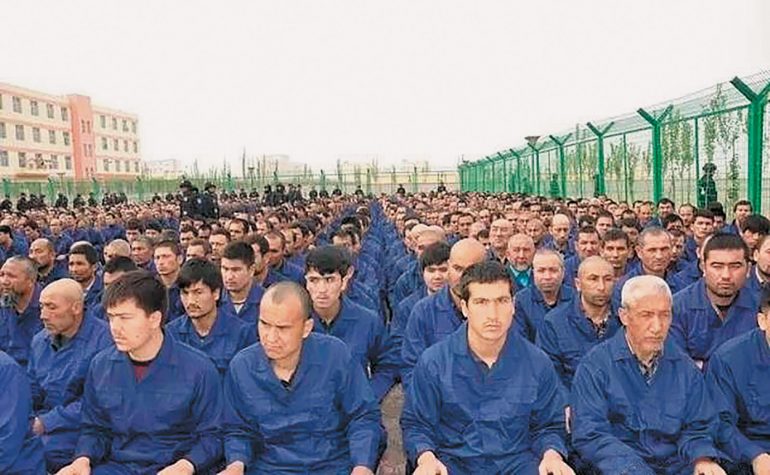A recent op-ed by Bel Trew, The Independent’s Mid-East correspondent (“UN relief agency for Palestinian refugees is almost out of cash – does anyone care?”, May 26), has the air of an expose on the tragic plight of an obscure tribe in some under-covered part of the globe, when, of course, quite the opposite is true. As we’ve documented continually on these pages, the Palestinians are the source a grossly disproportionate degree of coverage by foreign journalists like Trew.
Jamie Kirchick in an op-ed at the LA Times (“The world faces many tragedies. The lack of a Palestinian state ranks low on the list”, May 24) points out that, in fact, “few regional conflicts attract more diplomatic energy, media coverage and attention on the part of human rights activists than that between Israel and the Palestinians”.
Here are excerpts from Kirchick’s superb piece, which argues that the Palestinian obsession is unwarranted given the relatively small scale of the conflict, and that it serves to obscure other far more impactful global flashpoints.
By investing the Palestinian cause with such monumental importance, politicians and polemicists mistake a regional quarrel for a global struggle. Even before the state of Israel was founded more than 70 years ago, Arab regimes and their Western sympathizers began pushing a narrative that the proverbial “Arab street” is stirred by nothing more deeply than the fate of Palestine. Yet, as the so-called “Arab Spring” demonstrated, what really motivates the Arab masses are not Israeli settlements in the West Bank but the daily indignities of their own lives, blame for which lies with their rulers, not the Jews. And as for those rulers, Shia Iran’s growing assertiveness on a variety of fronts — a nuclear program on the threshold of weaponization, suborning the genocidal Assad regime, fueling the ruinous war in Yemen — has led the Sunni Arab states to reach a historic realignment with the nation they used to lambaste as “the Zionist entity.”
The human cost of the Israeli-Palestinian dispute is also marginal compared with other contemporaneous world conflicts. Since five Arab armies invaded the nascent Jewish state in 1948, the total number of casualties incurred on both sides pales in comparison to the lives lost in the Congolese civil war, the Russian carpet-bombing of Chechnya, or North Korea’s politically engineered famines. As you read this, some 1 million Uighur Muslims are languishing in Chinese reeducation camps, suffering a fate far more heinous than that endured by the average Palestinian.
…
The Syrian conflict erupted into a civil war that has taken the lives of at least half a million people, destabilized whole swaths of the Middle East
…
The amount of global resources heaped upon the Palestinians appears wholly disproportionate when contrasted to the measly efforts expended upon other stateless peoples, like the Tibetans and Kurds, whose claims are at least as justified and whose tactics have been nowhere near as morally objectionable. (It was the Palestinians, after all, who pioneered the scourge of terrorism in the 1960s and ’70s.) And as for the argument that U.S. military aid to Israel validates heightened attention to the conflict, a comparison with U.S. commitments — in actual blood and treasure — to treaty allies in Europe and Asia renders it hollow.
That the Palestinians lack a state is a tragedy, but it is a tragedy largely of their own making. More than once have they been presented with the opportunity to create a sovereign country alongside Israel; each and every time they responded with violence. On the long and growing list of world problems, the absence of a Palestinian state ranks somewhere between the conflicts over Transnistria and Western Sahara, neither of which you are likely to read about on newspaper front pages.
So, what motivates the media’s myopic focus on Israel and the plight of the Palestinians? Though we’ve long been hesitant to impute antisemitic motives to media outlets and the journalists reporting from the region, former Associated Press correspondent Matti Friedman has argued persuasively that antisemitic narratives are invariably evoked by such coverage:
When the people responsible for explaining the world to the world, journalists, cover the Jews’ war as more worthy of attention than any other, when they portray the Jews of Israel as the party obviously in the wrong, when they omit all possible justifications for the Jews’ actions and obscure the true face of their enemies, what they are saying to their readers—whether they intend to or not—is that Jews are the worst people on earth. The Jews are a symbol of the evils that civilized people are taught from an early age to abhor.
Regardless of the motivations and agendas of individual journalists, the foreign media’s obsessive and one-sided coverage of the region, Friedman concludes, is, in effect, “a morality play starring a familiar villain”.
Read Kirchick’s full op-ed here, and Friedman’s essay here.
Related Articles
- Obsession? Guardian publishes their 78th article on Mordechai Vanunu (UK Media Watch)
- Guardian again demonstrates its Israel obsession (UK Media Watch)
- The Guardian’s continuing obsession with Israel – by the numbers (UK Media Watch)





